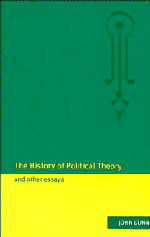Book contents
- Frontmatter
- Contents
- Preface
- Acknowledgements
- 1 Introduction
- 2 The History of Political Theory
- 3 Contractualism
- 4 Political obligation
- 5 Trust
- 6 The claim to freedom of conscience: freedom of speech, freedom of thought, freedom of worship?
- 7 Property justice and common good after socialism
- 8 The dilemma of humanitarian intervention: the executive power of the Law of Nature, after God
- 9 Specifying and understanding racism
- 10 Political science, political theory and policy making in an interdependent world
- 11 Democracy: the politics of making, defending and exemplifying community: Europe 1992
- 12 Is there a contemporary crisis of the nation state?
- 13 Political and economic obstacles to rapid collective learning
- 14 The heritage and future of the European left
- Index
10 - Political science, political theory and policy making in an interdependent world
Published online by Cambridge University Press: 05 February 2010
- Frontmatter
- Contents
- Preface
- Acknowledgements
- 1 Introduction
- 2 The History of Political Theory
- 3 Contractualism
- 4 Political obligation
- 5 Trust
- 6 The claim to freedom of conscience: freedom of speech, freedom of thought, freedom of worship?
- 7 Property justice and common good after socialism
- 8 The dilemma of humanitarian intervention: the executive power of the Law of Nature, after God
- 9 Specifying and understanding racism
- 10 Political science, political theory and policy making in an interdependent world
- 11 Democracy: the politics of making, defending and exemplifying community: Europe 1992
- 12 Is there a contemporary crisis of the nation state?
- 13 Political and economic obstacles to rapid collective learning
- 14 The heritage and future of the European left
- Index
Summary
For anyone interested in modern politics there could scarcely be a more pressing issue than how best to approach the task of identifying and comprehending the novel political challenges and opportunities which flow from the ever increasing interdependence of the destinies of human populations. At the intersection between challenge and opportunity there lie both fresh processes of policy making and implementation and distinctly older political routines and habits of mind: the attempt at worst to pour very new and volatile wine into disturbingly antiquated bottles, or at best to bring the accumulated resources of centuries of statecraft to bear upon a bewildering array of often unprecedented hazards.
The novel processes of policy making in this increasingly interdependent world can be thought of in two quite distinct ways: to speak briskly, either positively, or critically. Seen the first way - seen positively - their core is a set of new institutional sites, supra-national, transnational and domestic, official and unofficial, and an extravagantly complicated array of networks of communication and affiliation which link these sites. At these sites, already, a vast volume of business is transacted and, in consonance with the increasingly taut links between human populations, a far more ambitious and permanently expanding agenda is being tentatively explored. Some of these sites are relatively durable (OECD, GATT, the European Commission, the World Bank, the UN High Commission for Refugees, the Ford or Macarthur Foundations, UNESCO).
- Type
- Chapter
- Information
- The History of Political Theory and Other Essays , pp. 160 - 177Publisher: Cambridge University PressPrint publication year: 1995



